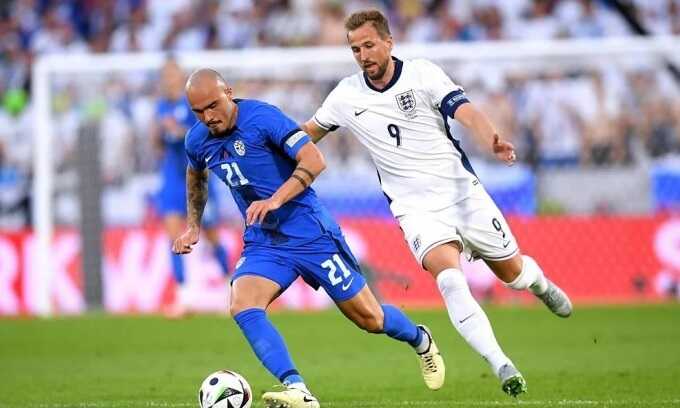England disappoint again but still top their group after a stalemate with Slovenia

It had been universally accepted that England needed a performance to reinvigorate their fans here in Germany after the toil of their opening Euro 2024 ties against Serbia and Denmark.
One of the principal takeaways from a claustrophobic and emotional night was that the fans were certainly connected.
Moved to boo at the interval after a display that lacked bite, they raised the intensity in the second period, belting out their songs for almost the duration of it. There was something faintly heroic about their efforts. They got louder and louder because they believed that a goal was coming. And if they did not believe, they sang anyway, losing themselves in the moment, the occasion. Call it blind faith.
They willed their team to make the breakthrough and yet it did not happen for a reason.
England lacked the penetration and the quality where it mattered the most, despite dominating for pretty much the entire occasion in terms of possession and territory. There was no big chance, no moment when the Slovenia goalkeeper, Jan Oblak, was seriously tested.
And when it was over, there were more boos from the stands, this time with greater feeling.
The crowd had been extremely supportive in the second half. They had done their bit. Now they turned because they felt that Gareth Southgate and the players had not. Southgate, especially. He remains the lightning rod for everything. When the England manager ventured on to the pitch to acknowledge those who had stayed behind, he heard loud jeers and had cups thrown down at him. It was a horrible low for him.
It was almost a footnote that England actually qualified on top of Group C after Denmark’s draw against Serbia and will now face a yet‑to‑be‑determined third-place finisher in the last 16. The Netherlands are one possibility. The others are Romania, Belgium, Slovakia or Ukraine.
There were positives for England. The defending remained secure, with Slovenia barely given the sniff of a chance. They were more preoccupied with digging out the draw that would take them into the last 16, their celebrations at full-time unfolding in stark contrast to the howls at the other end.
England brought greater intensity. They played higher up the pitch. Kobbie Mainoo made a difference after he came on at half-time for the out-of-sorts Conor Gallagher. Cole Palmer, another substitute, also showed his personality. Phil Foden played well. Bukayo Saka flickered. Harry Kane ran hard. And yet it was not enough, the overriding emotion of yet more frustration.
Southgate has always had a happy knack with tournament draws and his team now find themselves on the other side of this one to France, Spain, Germany and Portugal. Perhaps, the old line about knockout football being a different beast will apply.
One of the talking points concerned whether England could move the ball with any degree of slickness. It had been a major failing against Denmark. The supporters wanted something to get behind, anything, and there was a moment midway through the first half. It was a fine reverse pass from Declan Rice that got Foden in up the left, crossing to give Saka a tap-in. Foden was pulled back for offside.
It was plain that England would need guile because Slovenia were committed and compact in their 4‑4‑2 shape. They were happy to let Southgate’s players have the ball, asking the question: can you hurt us? The answer in the first half was a resounding no. England brought the energy, which was a plus point. Foden was in the mood off the left. But it was thin gruel and it was no surprise to hear the boos when the half-time whistle went.
The patterns were too predictable, there was not enough zip and incision. Gallagher, preferred to Trent Alexander-Arnold in midfield, was there for the hustle rather than his quality in possession while Jude Bellingham could get nothing going. Worryingly, that remained the case after the break.
Foden drew a routine save out of Oblak with a long-range free‑kick and the only time when England quickened the pulse in the first half was when Kieran Trippier whipped in a dangerous right-footed cross from the inside left. Gallagher looked as though he had to get there for the header only for the ball to flash over him. Kane could not react behind him.
Southgate had canned the Alexander-Arnold midfield experiment and he did likewise with the one involving Gallagher after 45 minutes. It is not possible to possess such a hesitant touch and thrive on an occasion such as this.
Southgate’s team stabilised and Mainoo’s composure was a part of it; his readiness to get into dangerous areas. There were still moments of looseness, the anxiety pulsing. Foden took on a speculative 30‑yard volley, Kyle Walker fluffed a first-time cross when he could have taken a touch.
England came to enjoy control and the good bit was that they looked like a team. John Stones had a header cleared from in front of the post and, on the next phase, Saka could not quite connect with an overhead kick. The goal was coming, wasn’t it?
The atmosphere among the 18,000 England fans really was something. But the goal did not come, Southgate’s team just not creating enough. When Palmer blasted at Oblak in stoppage time after a thrust involving Mainoo and Kane, the mood was about to darken.
Read more similar news:
Comments:
comments powered by Disqus

































